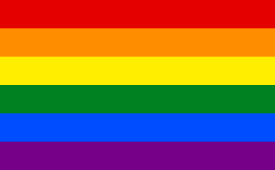Same-sex marriage in Manitoba
| Legal |
|---|
|
Reference Re Same-Sex Marriage Civil Marriage Act |
| Parliament |
|
38th House · 38th Senate 39th House · 39th Senate |
| Same-sex marriage by province |
| Related |
|
Civil unions in Quebec Adult interdependent relationship in Alberta Domestic partnership in Nova Scotia Common-law relationships in Manitoba |
Same-sex marriage is legal in Manitoba. On September 16, 2004, it became illegal for the Canadian province to continue to discriminate against homosexuals by denying civil marriage to same-sex couples. In the case of Vogel v. Canada, Justice Douglas Yard of the Manitoba Court of Queen's Bench ruled that the policy of the Government of Manitoba was unconstitutional, and ordered the province to begin issuing marriage licenses to same-sex couples.[1]
Manitoba became the fifth jurisdiction in Canada (and the eighth worldwide) to extend civil marriage to same-sex couples, after the provinces of Ontario, British Columbia and Quebec, and the territory of Yukon. Judge Yard said that his decision had been influenced by the previous decisions in B.C., Ontario and Quebec.
This decision followed a suit brought by three couples in Manitoba who were denied marriage licences by the Government of Manitoba. Both the provincial and federal governments had made it known that they would not oppose the court bid.
A June 2005 Winnipeg Free Press survey showed that of the 14 federal Manitoban MPs, eight were against same-sex marriages, five were for and one could not be reached.
Vogel v. Canada
In 1974, one of the couples, Chris Vogel and Richard North, had been married in the First Unitarian Universalist Church of Winnipeg,[2] but the Government of Manitoba refused to register this marriage.
On September 16, 2004, Justice Douglas Yard ordered the province to begin issuing marriage licenses to same-sex couples, ruling that bans on same-sex marriage were unconstitutional.[1] Vogel and North did not remarry because they had been married 30 years earlier in the Unitarian Church.[3]
The other couples involved in this case were Stefphany Cholakis and Michelle Ritchot, and Laura Fouhse and Jordan Cantwell. Both of these couples were issued marriage licences following the court order, and were married in Manitoba. Both Laura Fouhse and Jordan Cantwell are ministers in the United Church of Canada, and in 2015 Jordan Cantwell was elected to lead the Church as Moderator.[4]
A controversy emerged shortly after the ruling, when the province's Vital Statistics Office sent letters to the province's government marriage commissioners (not clergy) asking them to return their certificates of registration if they refuse to perform same-sex marriages. The federal Conservative justice critic, Vic Toews, announced he would file a complaint with the Manitoba Human Rights Commission if this policy was not rescinded.[5]
In 2015, Richard North filed a complaint of discrimination with the Manitoba Human Rights Commission when the Government of Manitoba again refused to register his marriage to Chris Vogel in the Unitarian Church.[6] The Commission referred this case to an adjudicator who heard the complaint in November 2017. The adjudicator ruled against the couple in January 2018.[7] The marriage certificate issued to them by the Unitarian Church in 1974 is now on display at the Canadian Museum for Human Rights.[8] A portrait of Vogel and North, by artist Rosey Goodman, is held by the Canadian Lesbian and Gay Archives in its National Portrait Collection.[9]
Provincial legislation
Common-law relationships
Since 2001, same-sex couples have had access to government-sanctioned relationships, providing them with some of the rights and benefits of marriage.
Marriage
In October 2008, the Marriage Act was amended by replacing the words "husband and wife" with "spouses".[10] Manitoba became the fourth province, after Quebec, Ontario and Prince Edward Island, to add a gender-neutral definition of spouse in its marriage laws.
Marriage statistics
Approximately 900 same-sex couples had married in the twelve years following the court ruling. An average of 79 same-sex marriages were celebrated per year, with the peak being 2014 with 107 same-sex marriages.[11]
References
- 1 2 "Same-sex marriage in Manitoba, Canada". Kingston: Ontario Consultants on Religious Tolerance. 21 September 2004. Retrieved 10 March 2011.
- ↑ "First Unitarian Universalist Church of Winnipeg".
- ↑ "40-year struggle to have groundbreaking same-sex marriage recognized still not over". Winnipeg Free Press. 19 September 2013. Retrieved 28 September 2017.
- ↑ "Jordan Cantwell".
- ↑ "Commissioners have right to refuse to wed gay couples: Toews". Canadian Broadcasting Corporation. 11 November 2004. Retrieved 10 March 2011.
- ↑ "Chris Vogel, Richard North fight for Manitoba to recognize 41-year same-sex marriage". CBC News, February 18, 2015.
- ↑ Failing to register 1974 same-sex marriage not discriminatory: Manitoba human rights adjudicator
- ↑ "Canadian Museum for Human Rights".
- ↑ "Canadian Lesbian and Gay Archives".
- ↑ "The Statutes Correction and Minor Amendments Act, 2008". Government of Manitoba. Retrieved February 11, 2016.
- ↑ About 900 LGBT couples tied knot since same-sex marriage legalized in Manitoba
External links

